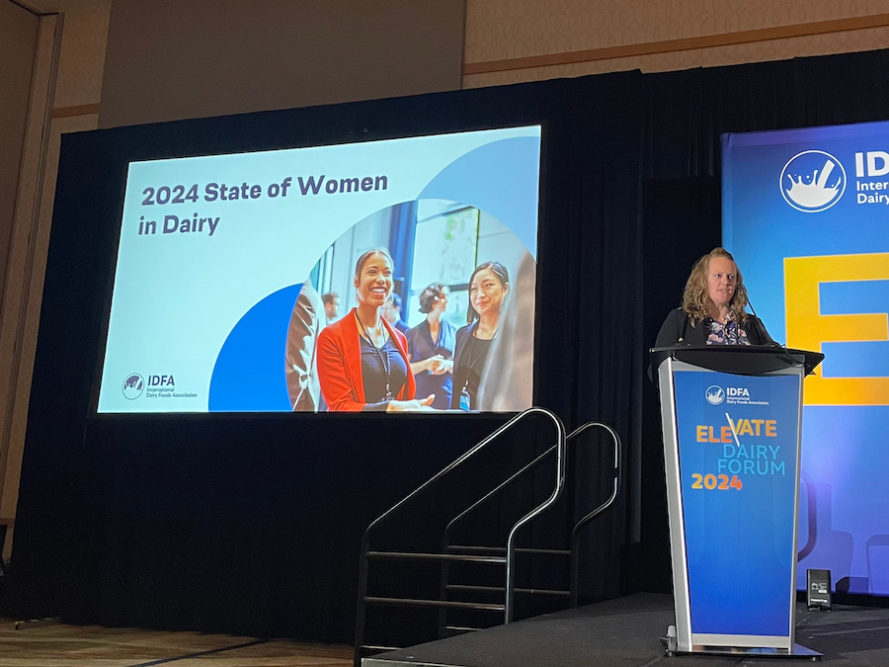PHOENIX – A new report released by the International Dairy Foods Association (IDFA) shows that while the dairy industry has made significant progress in supporting and empowering women, several challenges remain.
IDFA released the 2024 State of the Women in Dairy report Monday, following the "Elevating Women in Dairy" session at Dairy Forum. The goal of the survey is to establish gender equality benchmarking data for the US dairy sector and develop recommendations for possible industry actions.
“Through our first ever State of Women in Dairy report, IDFA is providing its members and dairy industry with data-based metrics and recommendations to support gender equality across the entire supply chain," said Becky Rasdall, vice president, trade policy and international affairs, and leader of the Women in Dairy initiative. "This report highlighted areas of strength and commitment on the part of dairy companies to support and empower women. It also highlighted many challenges. Women in the dairy industry report feeling less respected, facing pay disparities, desiring increased mentorship and encountering barriers to advancement due to gender biases. IDFA looks forward to engaging industry leaders on these challenges, to fostering a productive dialogue and to continuing to promote programs designed to support women and an inclusive dairy industry.”
The report was conducted by IDFA between Oct. 17 and Nov. 7, 2023, and included a sample of online surveys completed by 548 industry professionals. The survey respondents included 396 women and 152 men of varying ages, job functions and length of experience in the global dairy industry, including those working for processors, farms, farmer cooperatives, retailers and suppliers. IDFA conducted a similar, less comprehensive survey in early in 2023 to gather insights which were used to calibrate a more comprehensive State of Women in Dairy survey.
The survey focused on three categories of questions: demographic data, experiential responses and policy-based responses. The survey included both quantitative and qualitative questions for responses, with the latter focusing on perceptions, beliefs and attitudes. Statements describing experiences working in the dairy industry were taken directly from long-answer responses submitted to the online survey.
A panel, moderated by Rasdall, spoke about the report and the overall state of women in the dairy industry during Dairy Forum. Panelists included David Ahlem, chief executive officer and president, Hilmar; Robin Kane, chief people officer, Aurora Organic Dairy; and Annie Waring, director of business development, AmeriCold.
"I applaud IDFA’s efforts in undertaking a comprehensive survey to understand gender equity in the dairy industry," Kane said. "As the results indicate, we are slowly making progress through developing programs and policies for equitable pay and career advancement opportunities for women. However, the survey uncovered a number of challenges that we need to address."
According to the report, noted areas of strength in the US dairy industry include organizations having policies or procedures in place that prohibit discrimination based on gender, flexible work schedules and opportunities for advancement offered by employers.
The survey also revealed reported gender disparities, particularly in areas of career advancement, experiences in the workplace, compensation, mentorship and overall company policies supporting women. Responses indicate women in the industry often feel overlooked, undervalued and underpaid, and that their ambitions may be misrepresented. The survey results also highlight a disconnect between men and women on these same factors.
"Notably, women perceive that career growth in dairy is not on par with opportunities for their male colleagues," Kane said. "Companies can take action by institutionalizing early-career rotation programs for women to give them practical experience in core business functions such as production, supply chain, finance and sales. I’m encouraged by the transparency exhibited in the responses and look forward to seeing the results in subsequent surveys."
Additional takeaways from the report include:
• Much like in the wider manufacturing sector, the gender pay gap in US dairy is real, and it is a significant added challenge to women already feeling disadvantaged in obtaining promotions.
• Women in dairy report receiving less support from leaders within their organizations. Women feel that increased opportunities for mentorship, sponsorship and allyship offered by leaders would help women advance.
• Survey data indicated that women in US dairy are at least as ambitious as men, but that they felt their gender plays a significant role, both past and present, in their ability to advance within the sector.
• Promotion opportunities and flexible work schedules are critical factors to retaining women in US dairy, while men also indicate an interest in leaving the sector if promotion opportunities are not provided.
• Anti-discrimination policies on gender are widespread, but their implementation and effectiveness are unclear to respondents who seek greater cultural change than written policies.
The full State of Women in Dairy report is accessible online via IDFA’s website.

